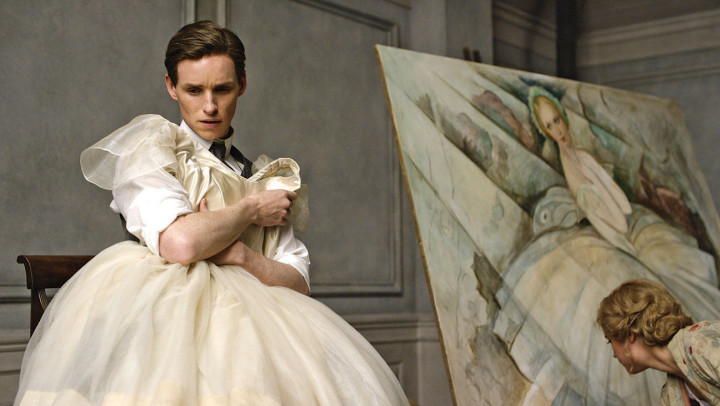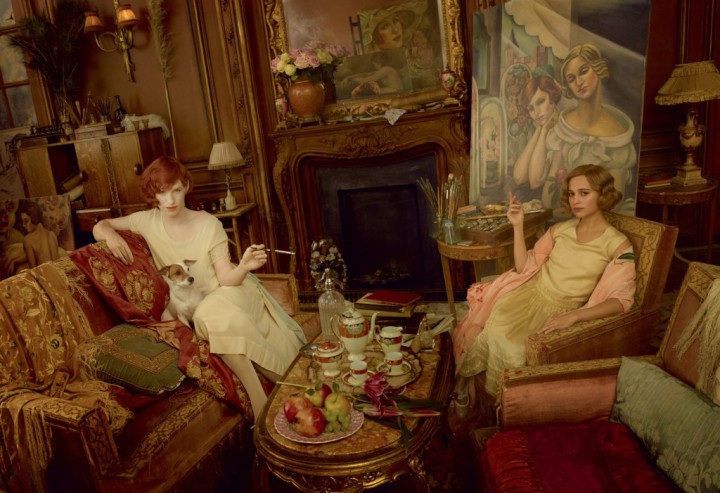There are good things in Tom Hooper’s The Danish Girl, and it is undeniably a terrific looking picture — but after two viewings, I am still left cold by it. It’s altogether too genteel, too careful, too much Oscar-Bait 101. Hooper’s flurry of Oscars for The King’s Speech (which I liked) seems to have trapped him in prestige picture amber. Here is a movie about one of the world’s first sex-change operations in which sex almost never rears its head and where the operation is explained in two lines of dialogue. This is a sex-change story that might almost be suitable for polite society in Victorian England. It is certainly unlikely to startle the horses of the 21st century. It’s the kind of high-toned message picture that allows the viewer to feel safely progressive-minded with no personal risk.
Though it more or less positions itself as a “true” story, it’s as well to realize that The Danish Girl is in fact based on a novel by David Ebershoff — one rife with invented happenings and characters. In a way, that’s neither here nor there, since biopics are not known for historical accuracy — not in the least because real life isn’t necessarily good drama. But there is a change here that completely alters the thrust of the story, which involves portraying Gerda Wegener (Alicia Vikander) as a doting straight wife, who, in essence, sacrifices herself to the needs of her sexually-conflicted husband, Einar (Eddie Redmayne). This actually makes the film more about Gerda and her noble suffering than about Einar’s transition into Lili Elbe. The problem is that it isn’t true. Gerda was, instead, openly bisexual, her art included much lesbian erotica (none of which is referenced in the film), and she was anything but devastated by Einar’s realization of his sexual identity. The truth is actually much richer and more interesting, but it’s not as easy a sell as the glossy fiction the film gives us.
This would all matter less if the film replaced it with anything solid, but it doesn’t. Instead, it becomes a tepid and confused tale of Einar’s (simplistically conveyed) journey into discovering that he’s really Lili — complete with an invented childhood kiss from a fictional character who grows up to become a fictional art dealer (Matthias Schoenaerts) and becomes a fictional romantic interest for Gerda. There’s also a relationship — so vaguely sketched in that is barely exists — between Lili and a fictional gay character (Ben Whishaw). The biggest issue, though, lies in the concept of Lili herself. Other than reduce Lili to poses and weak smiles that may or may not be flirtatious, the film has no idea what to do with her, and Eddie Redmayne’s performance doesn’t really help. His Einar hasn’t got a lot of personality, but his Lili has none — landing somewhere between a dewy-eyed D.W. Griffith heroine and one of those early Charlie Chaplin shorts where Charlie pretends to be a woman. Really, all that exists is his “problem.”
I don’t mean to indicate that The Danish Girl is entirely without merit. It is probably exactly the well-mannered, somewhat overproduced, easily digestible movie it intends to be. Hooper never misses a chance to underline a point (even Einar and Gerde’s dog with its neatly divided brown and white face is a symbol), and he never misses an appealing composition. Some scenes — notably Lili’s departure for surgery — may be bogus, but they work. And while the film doesn’t know what to do with Redmayne, it does do right by Alicia Vikander. It’s not awful, but it’s miles and miles from the greatness it seeks. Rated R for some sexuality and full nudity.








I’m so glad to read a review that reflects how I felt about this terrible movie that is so highly rated. It was slow, long, and insufferably boring. I didn’t believe any of the characters or their relationships . My wife and I debated walking out, but we had dinner reservations and it was too early –we should have left anyway.
When I saw someone had posted here, I was sure I was going to be taken to task for not loving this. I know people who claim to have been so moved by it that they were still crying on the way home. I wanted to like this. I tried to like it. But after two tries…no.
One viewing was painful enough for me. I must admire either your bravery or wonder about some masochistic tendencies . It would take a significant of money or some other huge reward for me to sit through that one more time. But I really appreciate your response to me. You’re now one of my favorite movie reviewers.
Having seen the trailer at least 6 times now, I can assert that I won’t be seeing this film. (But do enjoy actor Eddie Redmayne in other movies)
One viewing was painful enough for me. I must admire either your bravery or wonder about some masochistic tendencies .
I saw it first on an awards screener. Thinking that it might be better on a big screen — or that maybe I was just not in the right frame of mind on a single run — I went to the press screening. Well, size did not help.
I’m glad I’m not a professional film reviewer, because then I would have to view movies I know I will hate. I try to go to movies that I’m pretty sure I will enjoy by reading reviews ahead of time. Also, there are a handful of directors whose films I will automatically see no matter what any reviews say. Thanks for the conversation.
I find that reviews of bad movies are usually the most fun ones to write.
@Don Keller – I follow certain directors also. I’d be interested in learning of a few of your favorites?
Anyone else who wants to toss 4 or 5 out there, please do so. Thanks.
I find that reviews of bad movies are usually the most fun ones to write.
Depends on the kind of bad movie — and I wouldn’t call Danish Girl bad exactly. It’s fun to lay into real garbage like Love the Coopers, sure.
I didn’t wind up writing a Danish Girl review, but I would have given it a C+. Films in the C- to B- range are some of the more difficult films for me to write up since they involve unifying a mixed reaction into a cohesive review. Raves and slams are a blast; the others involve more thought to get my analyses across.
Actually, I find raves are often just as tricky to get across in a way that satisfies me. The mid-range is fairly easy if we’re talking “Perfectly Fine.” It’s the ones like this — well-intended, made with some artistry, but still don’t work — that are the hardest to do. (Insert complaint about the need to abolish star ratings and/or letter grading here.)